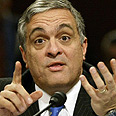
George Tenet
צילום: איי אף פי
How former CIA chief foiled Pollard's release
If Israeli spy's release were included in 1998 Hebron agreement, George Tenet would have been out of a job, former intelligence agency head explains in his new book
WASHINGTON - If Israeli spy Jonathan Pollard's release were included in the 1998 Hebron agreement, then CIA Chief George Tenet would have been out of a job, the former intelligence agency head explained in his new book released Monday.
In his book, 'At the Center of the Storm', Tenet discusses several issues, including the US war in Iraq and the global war on terror. Tenet also dedicates a chapter to detailing the events leading up to the signing of the Hebron agreement, and the Israeli demand to have Jonathan Pollard released.
Pollard, a former United States Naval civilian intelligence analyst, was convicted of spying for Israel and sentenced to life in prison in 1986.
In his book, Tenet, who was part of security negotiations between Israel and the Palestinians, reveals, for the first time, the events of the Wye Plantation summit before the signing of the Hebron agreement, and the pressure placed on him to include Pollard in the deal.

Demonstration calling for Pollard's release (Archive photo: Adi Shashtiel)
The drama reached its peak on Thursday, October 22, 1998, the night before the agreement was signed at the White House. The senior American staff, including Secretary of State Madeleine Albright and National Security Advisor Sandy Berger was present.
Berger told Tenet that then Israeli Prime Minister Benjamin Netanyahu put the Pollard matter on the table.
Upon hearing this, Tenet stormed out of the room, telling Berger that he was wrong and that Pollard was not on the agenda, calling the idea ridiculous and insisting that the Pollard issue had nothing to do with the talks taking place at Wye.
According to Tenet's account, Berger then told him that then US President Bill Clinton had not agreed to anything.
Tenet spent the next few hours contemplating how to respond. If Pollard was in the final package deal, no one at CIA headquarters would believe he had nothing to do with it, he thought.
Fearing that including Pollard in the deal would give the impression that an American citizen spying against his country was being rewarded and that he would have no moral capital in front of his soldiers and that his career in the CIA would be destroyed, Tenet decided that he would back out of the deal if the Clinton accepted these terms.
According to Tenet, the senior administration staff wanted the deal, but was afraid of his resignation.
Netanyahu gives in to American pressure
Near midnight, Secretary of State Madeleine Albright visited Tenet in his room and told him that if he had something to tell the president regarding the Pollard matter, he should say it now.After his talk with Albright, Tenet asked for a private meeting with President Clinton.
At the meeting, which took place at 1 am that Friday, Tenet said he told Clinton that if Pollard was released, he would no longer be CIA chief in the morning.
The next morning, then Prime Minister Benjamin Netanyahu held talks with Clinton on Pollard's release, and even threatened to end the negotiations. Netanyahu also claimed that Clinton had promised to release Pollard and Israel's headlines the next day reported that Pollard would be flown to Israel in the prime minister's jet.
According to the text, then envoy to the Middle East, Dennis Ross, told Tenet that he and Clinton consulted in the bathroom. Ross asked Clinton if he promised to release Pollard. Clinton said no.
Ross, not completely convinced, told Clinton that if he did promise to release Pollard, he must keep his word, saying that this would be too good a deal for Netanyahu to turn down.
The next morning, October 23, 1998, then-Israeli Defense Minister, Itzchak Mordechai, tried to pressure Tenet into agreeing, telling him that Israel must have Pollard. Tenet refused to fold.
Nonetheless, Tenet said that Ross had assured him that Netanyahu would not walk out on the agreement, even if it did not include Pollard. According to Tenet, Ross also opposed Pollard's release, since he believed he could be used as a bargaining chip in later deals.
In the end, Netanyahu gave in to American pressure, and signed the Hebron agreement – without Pollard.










